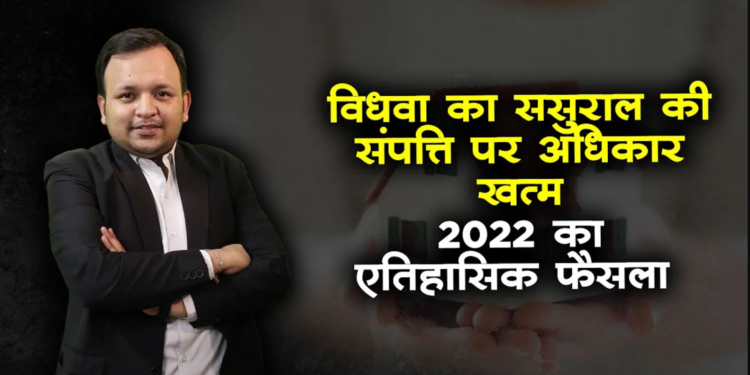Introduction
In matters of marriage and family, legal complexities can often arise, leaving individuals uncertain of their rights and claims. One such situation is a widow’s rights over her in-laws’ property. While the law is clear on a wife’s rights over her husband’s property, there is often confusion regarding what a widow can claim after her husband’s passing. Can a widow claim rights over his in-laws property? Let’s dive into the matter with the help of a Landmark Judgement.
In this blog, we will explore this matter through a specific legal case,
Laxmi & Anr v. Shyam Pratap & Anr, dated 18th April 2022.
If still there lies any doubt, feel free to contact us through ; https://thelegalshots.com/legal-opinion/
Brief Facts of the Case
The case revolves around a husband and wife who were living together. Tragically, the husband passed away, leaving the wife in a difficult situation. She moved back to her parents’ home and, under the Hindu Adoption and Maintenance Act, 1956, filed an application in the family court. In her application, she claimed a right over her in-laws’ property, stating that she had no independent source of income.
The family court, however, dismissed her application, citing certain provisions of the Hindu Adoption and Maintenance Act, 1956. Undeterred, the widow then appealed to the Delhi High Court, seeking justice and her rightful claim.
Final Judgement
As the matter reached the Delhi High Court, the arguments on both sides were carefully considered. The court specifically examined two sections of the Hindu Adoption and Maintenance Act, 1956:
- Section 19: According to this section, a widow can claim maintenance, but only if she lacks an independent source of income. Notably, her income cannot come from her children or her parents. In essence, she can claim maintenance only when she is entirely without financial support.
- Section 22: This section clarifies the conditions for a widow to claim ownership rights over her in-laws’ property. To make such a claim, the widow must prove that the property belonged to her husband and was inherited by his parents under the Hindu Inheritance Act.
After a thorough analysis of these sections, the Delhi High Court ruled in favour of the concerned widow. Section 19 of the Hindu Adoption and Maintenance Act, 1956 supported her claim for maintenance. However, when it came to claiming ownership over her in-laws’ property under Section 22, the father-in-law contended that the property was his self-acquired property and was not inherited by her husband.
Based on these considerations, the Delhi High Court dismissed the widow’s application, emphasising that she could claim rights to her in-laws’ property only under the conditions specified in the Hindu Adoption and Maintenance Act, 1956.
Conclusion
In the context of a widow’s rights over her in-laws’ property, the legal framework is clear. The widow can claim maintenance under specific circumstances defined by the Hindu Adoption and Maintenance Act, 1956. However, when it comes to ownership rights over the in-laws’ property, the widow’s claim depends on the property’s inheritance status.
This case serves as a reminder that legal provisions and conditions must be carefully examined, and the specific circumstances of each case considered when dealing with matters related to inheritance and property rights. A widow’s rights should be protected, but they are subject to the parameters set by the law.
For understanding more such complex law in simple ways, stay connected with www.thelegalshots.com .
If doubts still persist, contact our Legal Experts at Legal Opinion ► https://thelegalshots.com/legal-opinion/




